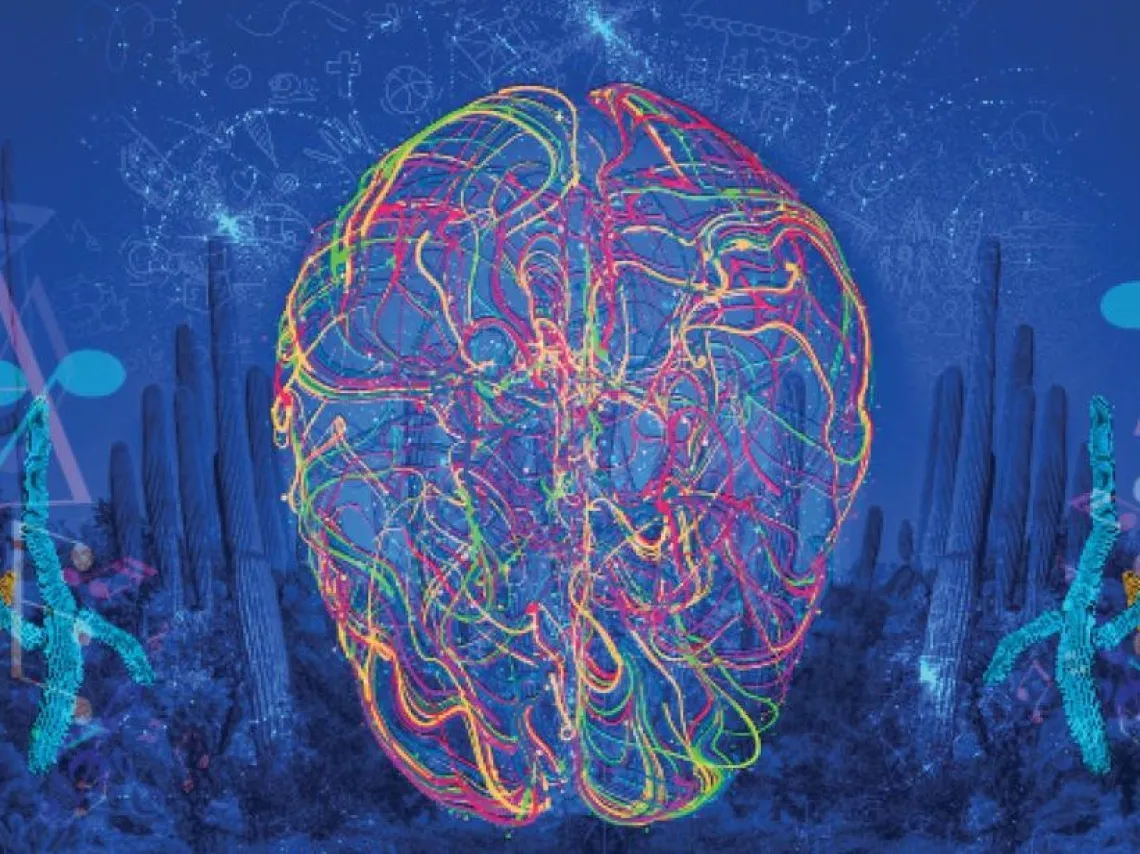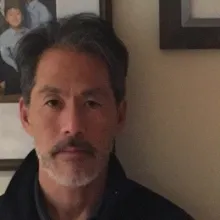Exploring the Science and Mysteries of Consciousness
Eugene Jhong has long been interested in Consciousness Studies. Now, he is helping a new generation of students explore this fascinating topic.

'The Science of Consciousness,’ is the world's largest and longest-running interdisciplinary conference addressing fundamental questions regarding consciousness.
Last year, Eugene Jhong heard a talk by Stuart Hameroff, director of the University of Arizona’s Center for Consciousness Studies, at the BrainMind Summit at Stanford.
Hameroff’s talk was titled “Consciousness Depends on Quantum Vibrations in Microtubules Inside Brain Neurons,” which was related to the "Orch OR" model of consciousness Hameroff developed with Sir Roger Penrose in the 1990s. Fascinated, especially after hearing people at his table dismissing the controversial theory, Eugene read up on the topic.
Eugene emailed Hameroff to learn more and decided to support the center’s annual conference “The Science of Consciousness” and its new educational initiative, which includes an undergraduate course in consciousness and the development of a minor program.
“I feel like consciousness is such a wonderful topic because it blends so many possibilities – computer science, psychology, biology, religion. It’s what I would have wanted to do when I was an undergraduate,” Eugene said.
The Path to Consciousness

When Eugene moved to the United States from the Philippines to go to Harvard, he gravitated toward many subjects, changing his major to psychology, religion, and economics, before settling on computer science. However, he felt he should be a lawyer like his dad, and was accepted to Harvard Law School.
“I remember the first day I was there, I opened up my books and thought I had made a huge mistake,” Eugene said.
Not one to give up easily, Eugene finished law school and practiced law for one year in New York before accepting that being a lawyer was not for him. Instead, he pursued his master’s in computer science from Stanford.
Former colleague Jeff Dean – who currently leads Google’s AI division – got him an interview at Google. Eugene was part of the Site Reliability Engineering team, helping to troubleshoot problems and maintain the server farms. “It was the group that nobody wanted to stay in because it was so grueling.”
Eugene describes his time at Google as a “difficult but wonderful experience.”
He left Google in 2006 to help his mother who was ill. He invested wisely, and since then, Eugene, who is only 51 and has two teenage sons, has been exploring what interests him. Those interests include consciousness studies.
“I love that it’s this great mystery,” Eugene said. “I feel like Arizona has been a sort of hotbed for this sort of radical exploration of consciousness. It’s exciting.”
Interdisciplinary Exploration
Last year, the Center for Consciousness Studies, or CCS, moved from the College of Medicine to the College of Social and Behavioral Sciences, where it began in the 1990s (see sidebar). The move helps CCS to expand its education offerings, with plans for an undergraduate minor and online programs for the public.
The center is well known for hosting 'The Science of Consciousness,’ (‘TSC’) the world's largest and longest-running interdisciplinary conference addressing fundamental questions regarding consciousness, the brain, reality, and existence. Held in Tucson in even-numbered years, TSC attracts 700 to 800 neuroscientists, philosophers, psychologists, artificial intelligence (AI) proponents, physicists, meditators, altered-state researcher, mystics and interested lay people from all over the world. In odd-numbered years the conference has been held in Italy, Denmark, Japan, Sweden, Czech Republic, Hungary, Hong Kong, India, Finland, San Diego, and Switzerland.
CCS also supports original research on consciousness, not only to understand the origins of consciousness, but to advance therapies for mental and cognitive disorders. Hameroff’s theory with Penrose, suggesting consciousness depends on a deeper level of quantum vibrations in microtubules inside neurons, is currently being tested experimentally. And CCS Associate Director Jay Sanguinetti in Psychology is studying the use of ultrasound aimed painlessly at brain regions to treat mental and cognitive disorders.
Linguistics and Psychology Regents Professor Tom Bever, who recently became CCS co-director of the when it moved to SBS, is leading the center’s education initiative. Bever’s own work focuses on how we organize continuous language as a conscious experience. Bever is excited at the prospect of developing a minor degree in consciousness studies involving the Honors College, the College of SBS, and the Center for Consciousness Studies. He adds there are only a handful of such programs, and this one will stand out with its breadth and the long history of consciousness studies at the university.
“I think it’s a perfect time for undergraduates to study consciousness studies, because of many interesting discoveries in the last 20 years as well as reformations of old ideas,” Bever said.
In the new consciousness studies course offered this spring, students from a variety of majors interacted personally with faculty experts in areas ranging from anthropology, Buddhism, computer science, linguistics, Native American Studies, philosophy, psychology, and medicine.
One student wrote, “This has been one of the most interesting courses I’ve taken. I had become fascinated by the study of consciousness before this, but the course solidified just how incredible the mind and brain are.”
Eugene was invited to listen to the students’ final presentations via Zoom. He said he enjoys seeing a gift’s impact at an individual level.
“I find it really fun to get to see these young minds question things at a very deep level. I think it’s just a wonderful opportunity for them.”
Eugene added: “Consciousness is all we know. It is our direct experience of the world. And to emphasize that to our young people in the academic setting is really important.”
##
A version of this story was in the 2020 SBS Developments magazine.
The Origin of Consciousness Studies at the University of Arizona
The age-old study of consciousness fell into disfavor in behaviorist-oriented psychology during most of the 20th century. In the late 1980s, popular books by notable scientists including Francis Crick and Roger Penrose revived interest, and in 1994 the first interdisciplinary conference on the topic was held at the University of Arizona, organized by Professors Stuart Hameroff in Anesthesiology, Al Kaszniak in Psychology, Alwyn Scott in Mathematics, and Jim Laukes in Extended UA.
A highlight was a talk by then-unknown philosopher David Chalmers. "The first morning was philosophy; the first two talks were really boring and the audience grew restless. Then Chalmers took the stage with shoulder-length hair, strutting like Mick Jagger," recalled Hameroff, professor emeritus in the Departments of Anesthesiology and Psychology.
"Chalmers talked about how problems like memory, learning, attention, and behavior were relatively easy compared to the really 'hard problem' of how and why we have conscious experience," Hameroff said. "We could have been nonconscious, robot-like 'zombies' with behavior but no inner life. How and why do we have feelings and awareness? That was the 'hard problem.”
"The audience buzzed” Hameroff said. “At that moment, we knew why we were there."
The 1994 conference spurred broad interest. "We hadn't considered a follow-up conference," recalls Hameroff, "but there was great demand for an interdisciplinary approach.”
The Center for Consciousness Studies was formally created by the Arizona Board of Regents in 1998 with a grant from the Fetzer Institute, and Chalmers soon returned to join the UArizona Department of Philosophy and serve as the second CCS director, taking over from Al Kaszniak. CCS was housed in the Department of Psychology, which at the time was in the College of SBS.
When Chalmers left the UA five years later, Hameroff became CCS director, hired Abi Behar-Montefiore as assistant director, and moved CCS to the Department of Anesthesiology in the College of Medicine. In her 13 years, Abi has skillfully managed CCS, its conferences and research, and help establish a community among conference participants.
In 2019, CCS returned to the College of SBS, where it now houses the new thrust in education, along with the established conference and research activities.
With contributions by Abi Behar-Montefiore and Shelley Littin

